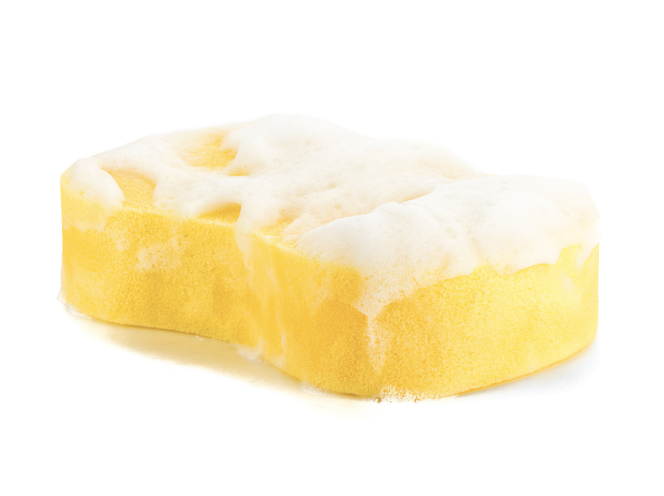
4 minute read
Clean Freaks
Why do we love watching something we hate doing?
Who would have thought watching a bloke called Nathan whipper-snipper an overgrown Sydney yard could rack up more than 125 million views on social media?
Clearly, none of us or we would have done it ourselves. Instead, it’s Nathan Stafford of Nathan’s Lawns and Gardens who has become an international sensation and poster-boy for society’s collective obsession with tidy-up videos. From decluttering to pressure washing, and mowing to sanding, the rise of cleaning reels is surely one of the strangest trends of the 21st century.
TikTok has even created a dedicated CleanTok channel dedicated entirely to the genre, with more than 150 billion collective views, more even than the wildly popular BeautyTok.
The irony, of course, is that while we’re glued to our screens, we’re chewing up valuable time that we could have spent actually tidying our homes or gardens. So, what gives with our obsession and how can we do a bit more of it IRL?
Cleaning videos have been growing in popularity for years, but they really went ballistic during Covid, which is a clue to what is driving the trend. It’s pretty much the antidote to doom-scrolling.
According to researchers, cleaning videos help induce a sense of calm when people are feeling overwhelmed. Watching time-lapse footage of someone bringing order to chaos can actually function as a mini therapy session, reducing levels of stress and anxiety. While that is positive in itself, being drawn to cleaning videos may be an indication you would benefit from bringing more order and a sense of control to your life and surroundings.
If you need motivation to switch your focus from viewing to doing, here are some big benefits that cleaning brings:
Your brain works better in a tidy space. A 2017 study published in Current Psychology found a significant link between clutter and procrastination. The visual stimulation caused by clutter (along with the reminder of jobs not done) can lead to cognitive overload that reduces working memory and ability to focus. So, decluttering your work space can boost your productivity. People with tidier homes have also been found to have lower levels of the stress hormone cortisol.
Cleaning can reduce stress and anxiety. Quite apart from the sense of calm a clean, well-organised space brings, the physical act of cleaning is also a good stress buster. Researchers have found time spent doing tasks such as washing dishes or vacuuming can provide important moments of mindfulness. Cleaning can also help restore a sense of control when people feel overwhelmed by factors beyond their control.
Cleanliness is next to healthiness. There’s a surprising amount of research linking good physical health to a tidy home. An Indiana University study found a correlation between greater physical fitness and cleaner homes, although there’s a chicken-or-egg debate about which influences the other. However, another study – that assigned participants to either orderly or disorderly rooms then offered them chocolate or fruit to eat – found people were less likely to reach for an unhealthy snack in an uncluttered environment.
Now you know all this, there’s no time like the present to put it into practice, clearing out the garden and decluttering the house to make way for Christmas entertaining. The hardest part is making a start, so here’s a few tips:
Start small: The downside to time-lapse cleaning and gardening videos is that they create a false impression of what is achievable. Hours of work are reduced to a 90-second clip because, well, who would watch four hours of gardening in real time? Set yourself small achievable goals: one junk drawer or cabinet, rather than a whole room.
Time not task: If you’re finding it difficult to start a job, it’s probably too daunting. Allocate your effort by time rather than task so it won’t overwhelm you. Thirty minutes is reasonable, and you’ll start to see results.
Don’t tidy and organise at the same time: They are different jobs. If you’re decluttering and organising, focus on just that. Cleaning is a separate task, and it is easier to do in a decluttered space.
Perfection is the enemy of completion: Your home is not content, so don’t compete with online images. Life is too short to colour-code bookshelves.
Start early and keep your eye on the prize: Most people find morning is the best time to tackle difficult tasks so getting up and at ‘em is a good plan. Keep in mind the scientific benefits of cleaning and imagine how great it will feel to put your feet up in a clean and calm space.



